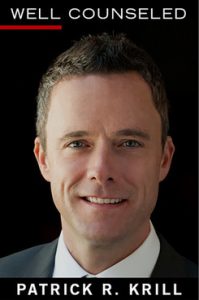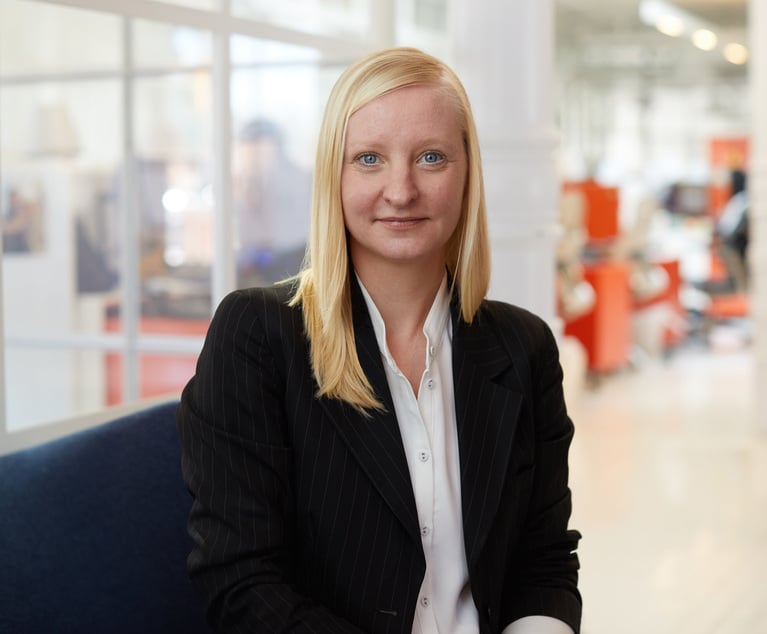'Just-Make-It-Happen' Mentality Is Bad for Lawyer Well-Being
The approach to work often tears through and disregards all boundaries and reasonableness.
March 19, 2019 at 01:33 PM
7 minute read
 Photo: Shutterstock
Photo: Shutterstock
I speak with lots of lawyers—several hundred in any given week—about mental health, substance use and personal well-being, especially in law firms. As you might imagine, I get a lot of feedback and answer many questions, the bulk of which tend to focus on getting at the root causes of the poor mental health and overall lack of well-being experienced by many.
This past week however, one comment stood out, so much so that I thought we should all take a minute and talk about it. The comment involved a phrase often associated with feats of endurance, which might seem harmless enough on the surface: “Just make it happen.”
As a mantra, “Just make it happen” (also known as “Just do it,” “Whatever it takes,” or “Git 'er done,” depending on style, preference and perhaps level of sophistication) might seem like a pronouncement of faith in someone's ability to complete a task—an affirmation of your trust in their competence, dedication and reliability.
And in many ways, it is. After all, you wouldn't say, “Just make it happen” to someone who you knew or believed could not, under any circumstances, be relied upon to do so. (For example, I've never once dropped a stack of forms on my pug at tax time and said, “Just make it happen.”)
When clients, faced with a seemingly insurmountable problem and in search of a favorable outcome, turn to their lawyer and say, “Just make it happen,” it would seem, in a sense, like they are simply signaling their confidence and bestowing their praise. The same thing could be said for law firm partners who then turn to an associate with a similar request. They've got an important deadline to meet and you are the person they are turning to in their moment of need. Pretty sweet, right?
In reality, the timeline may be disastrously unreasonable, the expectations inhumane, and the assignment itself utterly unclear but, damn it, they know you'll come through. You're a superstar, or at least this is your chance to show you could be. Now go back to your cave and, like they said, just make it happen.
 The problem with this attitude, aside from its tendency to produce a large volume of organic matter that rolls directly and unmistakably downhill in a work environment, is that it often tears through and disregards all boundaries and reasonableness, leaving someone else's weekend plans or basic human needs cast aside more thoughtlessly than wrapping paper on an eager child's gift. Self-care, already a mythical concept for many, goes out the window, displaced instead by stress, isolation, sleep deprivation, substance misuse or a litany of other less-than-ideal outcomes.
The problem with this attitude, aside from its tendency to produce a large volume of organic matter that rolls directly and unmistakably downhill in a work environment, is that it often tears through and disregards all boundaries and reasonableness, leaving someone else's weekend plans or basic human needs cast aside more thoughtlessly than wrapping paper on an eager child's gift. Self-care, already a mythical concept for many, goes out the window, displaced instead by stress, isolation, sleep deprivation, substance misuse or a litany of other less-than-ideal outcomes.
So yes, those people saying, “Make it happen,” are signaling confidence in your ability, but they simultaneously are signaling that you don't matter all that much. The same way they don't ask their SUV if it minds carting a load of groceries, they don't ask if their demands of you are in any way problematic. To them, you're a machine, and perhaps an expensive one at that. You had better start when they push the button and go when they push the gas. That's the deal, and if you don't like it, they've got time and money to trade you in.
Except, of course, you're not two tons of metal and glass bolted together on an assembly line in Toledo or Stuttgart. You're a human being, and you have needs, hopes, dreams and above all, inherent worth.
Of course, this type of behavior and mentality—that lawyers are essentially commodities with on-demand availability—is not new. Clients have always had time-sensitive needs, and lawyers have long wanted to promise excellent results at any cost, something widely seen as necessary in an ultra-competitive service profession with high billing rates. The problem though—again keeping in mind how many lawyers I hear from—is that the unacknowledged and significant costs of “just make it happen” are rising, and our boundaries of what's acceptable are slipping.
The pace of life and business are increasing, while our available downtime seems to be shrinking exponentially with every iteration of the iPhone. Any reasonable and candid person would acknowledge that it feels like an unsustainable path. And it feels that way because it is.
As a result, and in response, I'm suggesting that we all need to—even just incrementally—start pushing back on the unreasonable and start reclaiming our humanity. If that sounds unrealistic and out-of-touch to you, your rote critique of change is noted, but check back with me in 10 years when it will sound, in hindsight, a lot more like urgent prescience.
So, what am I proposing as tangible steps we could be taking to improve the situation? There are dozens, but I'll start with two, one for the organizations that employ lawyers and one for the lawyers themselves.
For the organizations, they need to recognize and invest in the fact that lawyers need training, education and encouragement to become better and more empathetic managers. The producer-manager dilemma has long plagued many law firms and, as a result, teams and matters are frequently being run by people with little or no skills to manage workflow, time or people.
Good lawyers, bad managers: This is a source of unnecessary stress in many work environments, prompting trickle-down toxicity, downward-flowing distress and an unchecked proliferation of “just make it happen” moments. It is also, at least by comparison, one of the easier problems to tackle.
The more important and more difficult step requires lawyers themselves to have better boundaries. Sometimes that will mean working to overcome your powerful and perhaps Pavlovian need for approval and external validation, and sometimes it will mean drawing upon a skillset you, as a lifetime high-achiever, don't have a lot of experience with: saying no.
In my years of counseling lawyers to overcome addiction, one of the most important things I could do was help them learn how to develop and enforce boundaries. If they didn't, their recovery would likely be tenuous and short-lived, because old behaviors would return and everything else would ultimately come before their own well-being and sanity.
If they did learn how to draw boundaries, they would stand a far better chance of flourishing. As a population, lawyers suck at boundaries, often seeing them as some sort of restraint on their potential or sign of weakness. In reality, they are neither, but lawyers tend to need some convincing of that.
Until we all take some greater level of ownership of our own distress, recognizing that our own choices, personalities and priorities have often led us to the precipice of breakdown, the problems will not abate. Our situation can be improved, but it's up to each one of us to just make it happen.
Patrick Krill is the founder of Krill Strategies, a behavioral health consulting firm focused exclusively on the legal industry. Go to www.prkrill.com for more information.
This content has been archived. It is available through our partners, LexisNexis® and Bloomberg Law.
To view this content, please continue to their sites.
Not a Lexis Subscriber?
Subscribe Now
Not a Bloomberg Law Subscriber?
Subscribe Now
NOT FOR REPRINT
© 2025 ALM Global, LLC, All Rights Reserved. Request academic re-use from www.copyright.com. All other uses, submit a request to [email protected]. For more information visit Asset & Logo Licensing.
You Might Like
View All
Avoiding the Great Gen AI Wrecking Ball: Ignore AI’s Transformative Power at Your Own Risk
6 minute read

'If the Job Is Better, You Get Better': Chief District Judge Discusses Overcoming Negative Perceptions During Q&A

'A Template' for Religious Accommodation: Attorney Gives Insight to $12M Win Over Employer's COVID-19 Vaccination Policies
Trending Stories
- 1What’s at Stake in Supreme Court Case Over Religious Charter School?
- 2People in the News—Jan. 30, 2025—Rubin Glickman, Goldberg Segalla
- 3Georgia Republicans Push to Limit Lawsuits. But Would That Keep Insurance Rates From Rising?
- 4Trending Issues in Florida Construction Law That Attorneys Need to Be Aware Of
- 5The Importance of Judicial Elections
Who Got The Work
J. Brugh Lower of Gibbons has entered an appearance for industrial equipment supplier Devco Corporation in a pending trademark infringement lawsuit. The suit, accusing the defendant of selling knock-off Graco products, was filed Dec. 18 in New Jersey District Court by Rivkin Radler on behalf of Graco Inc. and Graco Minnesota. The case, assigned to U.S. District Judge Zahid N. Quraishi, is 3:24-cv-11294, Graco Inc. et al v. Devco Corporation.
Who Got The Work
Rebecca Maller-Stein and Kent A. Yalowitz of Arnold & Porter Kaye Scholer have entered their appearances for Hanaco Venture Capital and its executives, Lior Prosor and David Frankel, in a pending securities lawsuit. The action, filed on Dec. 24 in New York Southern District Court by Zell, Aron & Co. on behalf of Goldeneye Advisors, accuses the defendants of negligently and fraudulently managing the plaintiff's $1 million investment. The case, assigned to U.S. District Judge Vernon S. Broderick, is 1:24-cv-09918, Goldeneye Advisors, LLC v. Hanaco Venture Capital, Ltd. et al.
Who Got The Work
Attorneys from A&O Shearman has stepped in as defense counsel for Toronto-Dominion Bank and other defendants in a pending securities class action. The suit, filed Dec. 11 in New York Southern District Court by Bleichmar Fonti & Auld, accuses the defendants of concealing the bank's 'pervasive' deficiencies in regards to its compliance with the Bank Secrecy Act and the quality of its anti-money laundering controls. The case, assigned to U.S. District Judge Arun Subramanian, is 1:24-cv-09445, Gonzalez v. The Toronto-Dominion Bank et al.
Who Got The Work
Crown Castle International, a Pennsylvania company providing shared communications infrastructure, has turned to Luke D. Wolf of Gordon Rees Scully Mansukhani to fend off a pending breach-of-contract lawsuit. The court action, filed Nov. 25 in Michigan Eastern District Court by Hooper Hathaway PC on behalf of The Town Residences LLC, accuses Crown Castle of failing to transfer approximately $30,000 in utility payments from T-Mobile in breach of a roof-top lease and assignment agreement. The case, assigned to U.S. District Judge Susan K. Declercq, is 2:24-cv-13131, The Town Residences LLC v. T-Mobile US, Inc. et al.
Who Got The Work
Wilfred P. Coronato and Daniel M. Schwartz of McCarter & English have stepped in as defense counsel to Electrolux Home Products Inc. in a pending product liability lawsuit. The court action, filed Nov. 26 in New York Eastern District Court by Poulos Lopiccolo PC and Nagel Rice LLP on behalf of David Stern, alleges that the defendant's refrigerators’ drawers and shelving repeatedly break and fall apart within months after purchase. The case, assigned to U.S. District Judge Joan M. Azrack, is 2:24-cv-08204, Stern v. Electrolux Home Products, Inc.
Featured Firms
Law Offices of Gary Martin Hays & Associates, P.C.
(470) 294-1674
Law Offices of Mark E. Salomone
(857) 444-6468
Smith & Hassler
(713) 739-1250








